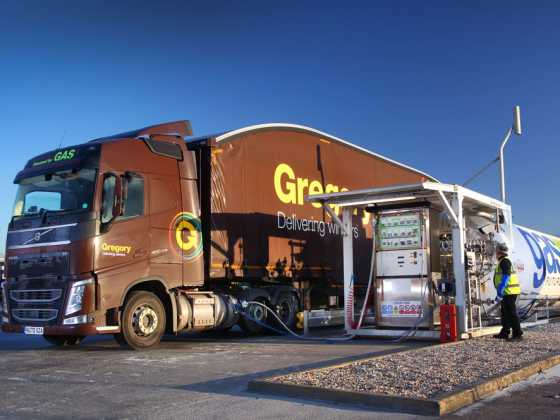An increasing buzz around hydrogen

With the Prime Minister Boris Johnson saying the government would “invest massively” in hydrogen, and businesses pledging they are ready to invest £3billion in UK hydrogen projects, has the time for hydrogen come? Rob Dale from the UK Hydrogen Strategy Now Campaign looks at recent developments
The huge momentum that has grown behind the UK’s hydrogen economy is continuing at pace. Businesses have made it clear there is £3 billion ready to be invested right now into ‘shovel-ready’ UK hydrogen projects. That’s a big step forward from earlier in the year, when the cross-industry Hydrogen Strategy Now campaign estimated that its members were ready to pump £1.5 billion into the UK hydrogen economy.
It almost feels as if new, exciting developments about the UK’s hydrogen economy are being announced every day. Wrightbus has deployed the world’s first hydrogen double-decker buses onto the streets of Aberdeen, with more set to be rolled out in Belfast, Birmingham, and London. Worcester Bosch is developing world-leading hydrogen-ready boilers. ITM Power’s funding round to build the world’s biggest hydrogen Gigafactory in Sheffield was massively oversubscribed, raising £165 million. Riversimple, a hydrogen passenger car manufacturer, has begun a £150 million funding round to build their first factory in Mid Wales.
There are fantastic UK-based projects relating to hydrogen for heating taking place right now. The HyDeploy project at Keele University is demonstrating we can blend up to 20 per cent Hydrogen into the gas network now, without affecting the way people heat their homes. Northern Gas Networks’s H21 project, that runs between Yorkshire and Teesside, is trialling 100 per cent hydrogen in an existing gas network – a world first. Cadent’s HyNet project, in the North West, is demonstrating blending hydrogen for homes and heavy industry to save over one million tonnes of carbon dioxide emissions every year – the equivalent of taking more than 600,000 cars off the road.
A boost for the economy
Members of the Hydrogen Strategy Now campaign, which combined employs around 100,000 people and has a value of £100bn in the UK, say their shovel-ready projects would create thousands of jobs across the country, helping to kick start a post-Covid green recovery. Attracting cross-party support, the Hydrogen Strategy Now campaign wants to see a clear, strategic plan to help unlock significant private funding in hydrogen technologies and manufacturing across the country, driving growth and generating hundreds of thousands of green jobs. Meanwhile, the UK Hydrogen Task Force estimates that investing in hydrogen in the UK could unlock £18 billion in GVA by 2035 and support 75,000 additional jobs. This is a once-in-a-generation opportunity.
Government enthusiasm
The Prime Minister clearly has a personal enthusiasm for the technology, stating in July that his government would “invest massively” in hydrogen. The government has formed a Hydrogen Advisory Council to formalise its engagement with industry on hydrogen. The publication of a UK hydrogen strategy has been confirmed for the first quarter of 2021. The Tees Valley has won designation as the UK’s first hydrogen transport hub. Just recently, the Prime Minister appointed Andrew Griffith, Conservative MP for Arundel and the South Downs and a Vice-Chair of the All-Party Parliamentary Group on Hydrogen, as the government’s net zero business tsar, another positive step in the right direction. And it’s not only the government that is talking enthusiastically about hydrogen - Labour recently published its Green Recovery policy document, which contained a whole section on the importance of unlocking the UK’s hydrogen economy.
However, although the momentum is clearly growing, and private investment is ready to be deployed, there is still a very real risk that the UK could end up being left behind by the rest of the world. Unless the sector receives a serious financial commitment from the government through the upcoming Transport Decarbonisation Plan, the Energy White Paper, the Spending Review, and the hydrogen strategy due to be published in early 2021, the UK risks being outgunned by other countries who are investing heavily in hydrogen.
Germany, for example, has committed 9 billion euros and France over 7 billion euros to their own hydrogen strategies. There are unfortunately businesses in the hydrogen sector who are warning the government that, without investment very soon, they will be looking to shift projects to other countries where the financial commitment to hydrogen is already in place.
The Government should set out its Hydrogen Strategy with ambitious, but achievable, short-term targets that cover both the supply and the demand side of the hydrogen economy. For example, targets such as 4,000 hydrogen buses, 50 hydrogen trains, fleets of hydrogen bin lorries, police cars, ambulances, and taxis, the launch of hydrogen ships, and aeroplanes. The South Korean government has set a target of introducing 200,000 hydrogen vehicles and 450 hydrogen refuelling stations by 2025 – we should seek to match this scale of ambition. The government could also legislate for the introduction of hydrogen-ready boilers by 2025 to accelerate the deployment of hydrogen for heating.
A circular energy system
What is particularly exciting about hydrogen is its potential to create a resilient, self-sufficient, and circular renewable energy system. For example, the Prime Minister has expressed his laudable ambition to massively scale-up the UK’s offshore wind capacity. The excess green energy produced by additional offshore wind facilities can power the electrolysis needed to create more green hydrogen, which can then be used for green heating, green transport, green industry, and numerous other possibilities. That’s why it is absolutely vital for different government departments, such as BEIS, DfT, DEFRA, the Treasury and others to make sure they are working together effectively on hydrogen policy - it is a unique opportunity to create a synchronised, British-made green energy infrastructure.
The COP26 Climate Conference coming up next year, hosted in Glasgow, will be a perfect showpiece opportunity for the government to demonstrate to the world just how committed they are to driving forward the UK’s hydrogen economy. We need to send a clear signal to the world that the UK is going to be right at the very forefront of the global pack when it comes to hydrogen. This is not an opportunity we can afford to miss.






